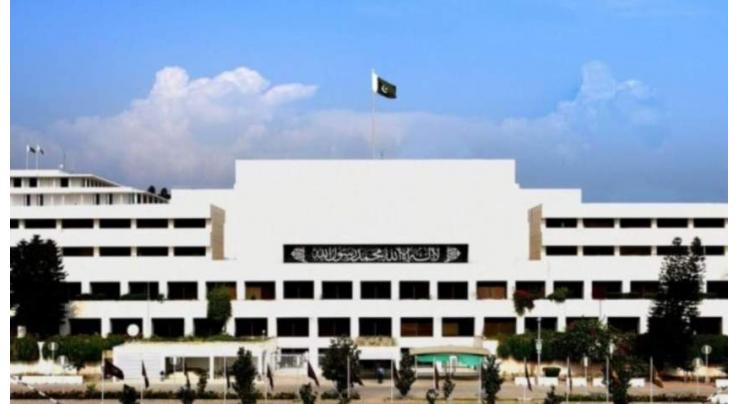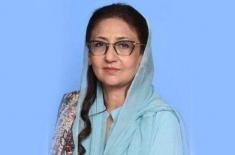
Senate IT Committee Reviews AI Regulation, Crackdown On Illegal Call Centers
Faizan Hashmi Published July 31, 2025 | 08:07 PM

The Senate Standing Committee on Information Technology and Telecommunication on Thursday held an in-depth discussion on several key issues, including the “Regulation of Artificial Intelligence Bill, 2024,” national AI capacity building, quality of telecom services, chip design progress, and the recent crackdown on illegal call centers
ISLAMABAD, (UrduPoint / Pakistan Point News - 31st Jul, 2025) The Senate Standing Committee on Information Technology and Telecommunication on Thursday held an in-depth discussion on several key issues, including the “Regulation of Artificial Intelligence Bill, 2024,” national AI capacity building, quality of telecom services, chip design progress, and the recent crackdown on illegal call centers.
Chaired by Senator Palwasha Mohammad Zai Khan, the committee reviewed the AI regulation bill introduced by Senator Dr Afnan Ullah Khan.
The proposed legislation aims to establish a legal and ethical framework for the responsible development and use of AI technologies in Pakistan.
Recognizing the global shift toward emerging technologies, the committee underlined the urgency of introducing AI regulation.
The Secretary of the Ministry of IT and Telecommunication (MoITT) informed the committee that a dedicated Emerging Technology Wing has been established to drive progress in four priority areas: Artificial Intelligence, Semiconductors, Cybersecurity, and Quantum Technologies.
He said Rs16 billion has been allocated under the Public Sector Development Programme (PSDP) for FY2024–25 to support these initiatives. Senator Saifullah Sarwar Khan Nyazee questioned whether this funding would be sufficient to meet the ambitious goals.
The meeting also featured a debate over the development of Pakistan’s first indigenous Large Language Model (LLM), being undertaken by Jazz and NUST University.
Senator Dr Mohammad Humayun Mohmand questioned the selection process, expressing concern that other qualified institutions were not considered.
The Secretary clarified that the project was initiated and funded independently by Jazz and NUST, without official selection or public funding. He welcomed Senator Mohmand’s suggestion to publicly invite universities to participate, confirming that a national call for expressions of interest is now underway.
Jazz representatives briefed the committee on the LLM project, stressing its role in preserving Pakistan’s local languages. However, they pointed out that data collection remains a major hurdle.
The committee also received an update on chip design efforts, with the Secretary reporting that 12 companies are currently working in this area, and over 7,000 students are being trained in tech-related skills to support the growing semiconductor industry.
On the issue of cybercrime, the Director of the National Cyber Crime Investigation Agency (NCCIA) gave a comprehensive briefing on recent raids against illegal call centers.
He reported that 54 such centers had been raided across the country, resulting in 254 arrests. Islamabad saw the highest number of operations. These centers, employing 300–400 people each, used fake social media accounts—often posing as women—to trick victims into investment scams. Once trust was built, victims were moved to Telegram channels where they were defrauded on a larger scale.
The stolen funds were often converted into cryptocurrency and transferred abroad, making tracking and recovery difficult.
Committee members voiced concern over the fairness and transparency of national tech initiatives, stressing that all capable universities and private-sector entities should have equal access to AI development opportunities.
They called for stronger legal frameworks to combat cyber fraud and digital scams, as well as sustained investment in emerging technologies and digital skills training.
Chairperson Senator Palwasha Mohammad Zai Khan reaffirmed the committee’s commitment to effective oversight, enhanced digital security, and inclusive growth in Pakistan’s tech sector.
Recent Stories

Currency Rate In Pakistan - Dollar, Euro, Pound, Riyal Rates On 2 August 2025

Today Gold Rate in Pakistan 02 August 2025

Russia:120 aftershocks registered in Kamchatka in past 24 hours

EU rules on general-purpose AI models start to apply tomorrow, bringing more tra ..

UAE, Jordan lead airdrop operation of humanitarian aid in Gaza alongside France, ..

Austria's inflation hits 3.5%, highest since April 2024

Bilawal lauds Pakistani media's role during recent Pak India conflict

30 injured as train derailed near Kala Shah Kaku

Govt. focused on development, PTI spreading hate: Shezra Mansab

AJK prepares to celebrate Pakistan's 78th Independence Day

Two week long tree plantation campaign starts at QUEST University.

Rana urges PTI to adopt democratic way to address political issues
More Stories From Pakistan
-
Railways Minister seeks train derailment report within 7 days
10 hours ago -
Train routes diverted after Islamabad Express accident; relief efforts underway
10 hours ago -
NA Speaker regrets Islamabad Express mishap near Kala Shah Kaku
10 hours ago -

Bilawal lauds Pakistani media's role during recent Pak India conflict
10 hours ago -

30 injured as train derailed near Kala Shah Kaku
10 hours ago -

Govt. focused on development, PTI spreading hate: Shezra Mansab
10 hours ago
-

Two week long tree plantation campaign starts at QUEST University.
11 hours ago -

Rana urges PTI to adopt democratic way to address political issues
11 hours ago -

U.S. shows investment interest in key Pakistani sectors: Advisor
11 hours ago -

Ambassador Qureshi discusses Pakistan's tourism with media experts
11 hours ago -

US Consulate Lahore has new Consul General in Stetson Sanders
11 hours ago -

Two separate incidents claim two lives in Attock
11 hours ago








